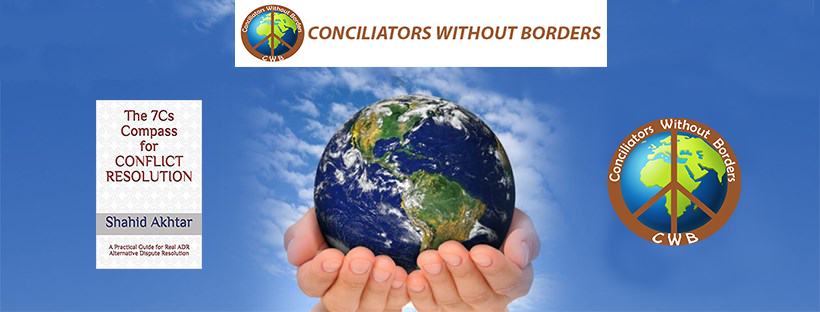

what is Conciliators Without Borders Services
Conciliators Without Borders Services Inc. (CWB) is an organization dedicated to turning adversaries into partners seeking common good. It offers customized programs aimed at resolving conflicts in a way that looks after the best interest of all stakeholders. Some of the services offered by CWB to public and private sectors include, but are not limited to, the following
Conflict is a reality of life. Whenever two or more persons are involved in any human interaction, there is the possibility of a dispute. Each difference of opinion, choice and viewpoint carries the potential of conflict. We all know the importance of relationships in our daily lives. In dealing with our bosses, peers or subordinates; spouse, children or parents; clients, associates or partners; friends or neighbours we can all recall some situations which ended up in a conflict.

How do we resolve such conflicts?
We can choose confrontation or an approach where we maintain positive workable relationship and yet get most of what we want.
In this introductory half day course we will learn how to resolve a conflict without confrontation, aggression or violence. While our focus is on workplace, the principles and practices learned can be applied with equal effectiveness in personal, family, business, political and interfaith contexts. Following the 7Cs© Compass approach ensures the best possible outcome under the given circumstance with a fraction of cost in dollar, time, and energy.

WHAT WILL YOU LEARN?
Participants will be able to identity a simmering undercurrents which could easily turn into serious disputes or even violent incidents. As decision makers you will learn the practical benefits of managing conflicts before it is too late for non-confrontational resolution.
TRUE COST OF CONFLICT
- Financial Costs
- Loss of Productivity
- Serious Health Issues
- Diminished Quality of Life
- Heavy Emotional Toll
- Low Esteem and Self Confidence
RESOLUTION OPTIONS

Do nothing
This option may buy us some time in the false hope that the conflict will go away but the reality is that it continues to simmer and may later explode with a ferocity we had not expected.

Deal directly with the conflicting party
By directly engaging with our opponents, we can go to the source of the conflict. Our adversaries might have acted in ignorance and talking may help clear the air. This option also has the potential to backfire. Adversaries could become more stubbornly entrenched in their positions and resort to confrontation or even violence.

Formal avenues
We could use formal avenues like filing a law suit, contacting the police or initiating formal complaints processes available in different tribunals and governing bodies. These avenues are designed to give a clear decision which could as easily go against us. Even if we win we would have a resentful conflicting party wanting to get back at us at the first available opportunity.

Conciliation/Mediation
We could consider involving someone who is trusted by both parties with no vested interest in the eventual outcome.
In this option we retain a fair degree of control over the possible outcome. We contribute to crafting a fair and equitable resolution. With cooperation and compromise both sides could win. The pre-requisite for mediation is that adversaries are at least willling to give this process a chance either voluntarily or as command performance.
What is 7Cs Compass © of Conflict Resolution ?
The first step in addressing a conflict is to accept that the conflict exists. The act of conciliation with what IS is the most crucial stage of a process that can lead to a successful resolution. Once we have reconciled with the reality of the dispute, we can do something about it.
We must ask ourselves if we are fully committed to resolving the conflict. Is our motive the resolution or getting even? Are we committed to do our part at least, no matter what the other party does? We should be committed to the best alternative to safeguard our interest under the circumstances.
We must approach the entire process with a sense of compassion and not treat our adversary as enemy but as a partner who can assist us in finding a resolution to the conflict. Compassion produces fair and win-win resolution.
Once we make sure that the other party understands where we are coming from and both sides are on the same page about the nature of the conflict then we need to concentrate on seeking the resolution. We should stay focused and must not get distracted.
Listening skills can make or break our chances of successful resolution. We must allow the speakers to have their say without interruption. Reiterating what we heard and reversing the process giving the other side the same opportunity can remove all misinterpretation and misunderstanding. We should watch body language and keep an open mind. We can disagree without being disagreeable.
In a fair resolution neither party gets 100 %. We need to be ready to cooperate and compromise and consider that the other side might be right
We should avoid approaching the conflict resolution in fits and starts. Once the process begins we should keep at it till the agreement is reached or the process culminates. New complications always intrude if the process is interrupted. Once we arrive at a decision or an agreement we must bring the matter to a complete closure. We need to get over the conflict and move on with our lives. No conflict should be allowed to scar us for life.
TIPS
Ensure that you do your part. Resolve conflict with cooperation and agreement, not with hostility or driven by a desire for revenge.
Diffuse the situation, don’t infuse it.
Be honest with yourself. Know your truly best interest. Negotiate from strength. Magnanimity comes only from self assurance and confidence.
Follow the Golden Rule. Wish for others what you would wish for yourself. Be generous.
Be on your own side. Sometimes we are the biggest obstacle in the way of our own best interests in conflict resolution process.
Be ready to walk away. Often the most effective strategy is having the self confidence to walk away from the offer at hand.
Accept what is realistically possible, not your ideal.
Take responsibility for creating and resolving the conflict.
Never underestimate your uniqueness. What works well in your situation may not work for others.
In the end the real resolution depends on you alone. The value is not in external things, but how you face them. It is in your hands.
